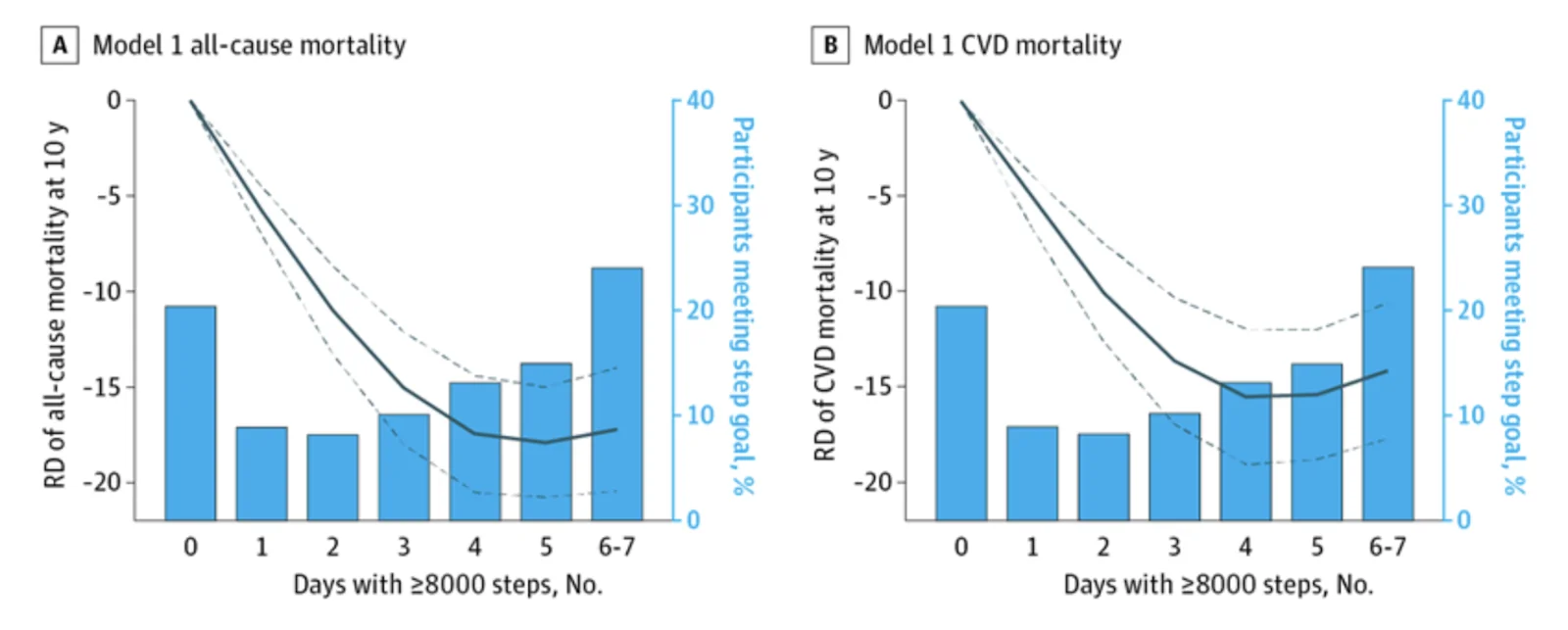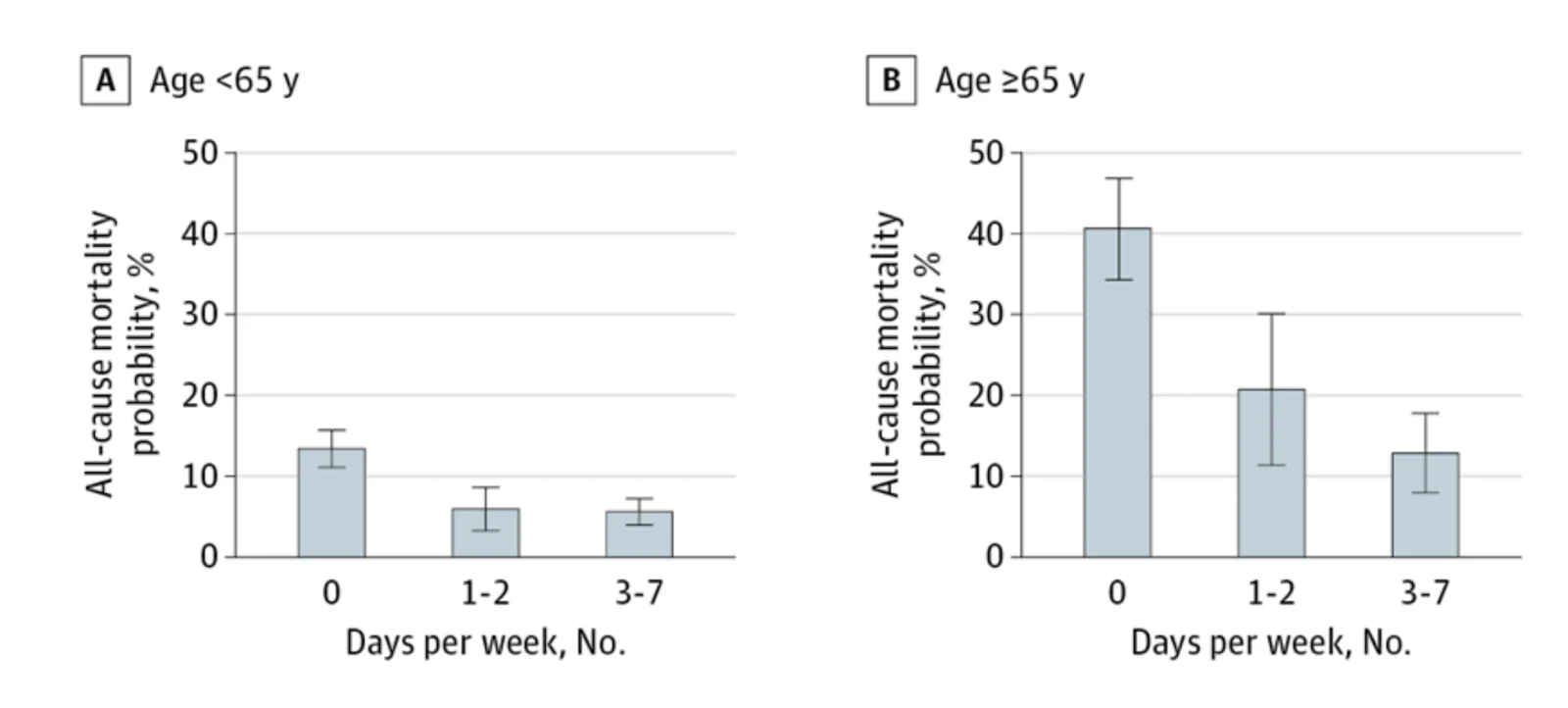A new study using wearable accelerometers suggests that you don’t have to clock extreme numbers of steps every day to stay healthy [1].
Do you always need to hit the target?
A tight association between physical activity and health is widely known [2]. In fact, staying fit might be the best anti-aging intervention currently available. However, just how much exercise is the optimal amount, and whether there can be too much exercise, is debatable.
According to one meta-analysis, more daily steps are associated with reduced mortality, up to about 8000 steps a day [3], after which the association plateaus. For comparison, the average American only clocks 4800 steps a day. The authors of this new observational study investigated a relationship between the number of days of the week spent in that “sweet spot” and average mortality, which determines how critical it is to achieve this level of physical activity.
Four days a week seem best
These researchers from the University of California, Los Angeles, and the University of Kyoto, Japan investigated a cohort of 3101 adult participants in the National Health and Nutrition Examination Surveys of 2005-2006 who wore accelerometers for 1 week. Their mortality data was subsequently recorded until 2019.
In this demographically robust cohort, men and women were equally represented, the median age was 50, and about 50% were of European descent. The cohort was quite active, probably indicating an initial selection bias: 632 (20.4%) participants did not take 8000 steps or more during the study week, 532 (17.2%) did this 1 to 2 days, and 1937 (62.5%) took that many steps 3 to 7 days. Over the 10 years of follow-up, 439 deaths from all causes and 148 deaths from cardiovascular disease were recorded. The statistical models were adjusted for several potential confounding variables, including age, sex, race and ethnicity, smoking, BMI, history of diabetes, cardiovascular health, and cancer.
Analysis showed a curvilinear relationship between the number of 8000+ steps days per week and mortality: the risk of both all-cause and cardiovascular mortality dropped sharply between 0 and 2 days, continued to decline significantly between 2 and 4 days, and then plateaued. Moreover, a slight upward trend was observed between 5 and 6 days for all-cause mortality and 4 and 7 days for cardiovascular mortality.

More helpful for older people
When additionally adjusted for average daily step count, the model showed the same relationship, albeit blunted, suggesting that regularity of physical activity might also be important and that additional step counts below 8000 a day are still beneficial. The researchers performed several additional sensitivity tests, including with different daily thresholds (6000 and 10,000 steps), but none of those significantly changed the picture.
Stratification by age showed that for people younger than 65, there was no significant difference in all-cause mortality between the 1-2 “8000+ step days” group and the 3-7 days group. In people older than 65, the gap between those two groups was more pronounced, although it was still much smaller than the difference between the 0 days group and the 1-2 days group.

The effect size for people younger than 65 was 7.4% and 7.8% reduced all-cause mortality in the 1-2 days and 3-7 days group, respectively, compared to the 0 days group. For people older than 65, these numbers were 19.9% and 27.7%. Women seemed to benefit from walking less than men.
In this cohort study using nationally representative data for US adults, we estimated that a higher number of days taking 8000 steps or more throughout the week is associated with a decreased risk of all-cause and cardiovascular mortality at 10 years. Even participants who only took 8000 steps or more 1 or 2 days during the week showed a substantial reduction in all-cause and cardiovascular mortality compared with those who were active more regularly (ie, took ≥8000 steps for 3-7 days per week). The estimated association was also robust to using different thresholds between 6000 and 10 000 steps for the daily step counts. Our study findings suggest that for those individuals who face difficulties in exercising regularly (eg, due to work and/or family obligations), achieving recommended daily steps only a couple days per week can have meaningful health benefits.
Conclusion
This study has several strengths and limitations. On the one hand, it used accelerometers rather than questionnaires, which allowed the researchers to get a more reliable picture of exercise patterns. On the other hand, the cohort was relatively small, and the participants had only used accelerometers for one week. As wearable devices become ubiquitous, scientists should soon be able to gather more data on everyday physical activity. Until then, preliminary evidence suggests that hitting your step target 3-4 days a week is almost as beneficial as doing so every day, but some daily exercise is also a good idea.
Literature
[1] Inoue, K., Tsugawa, Y., Mayeda, E. R., & Ritz, B. (2023). Association of Daily Step Patterns With Mortality in US Adults. JAMA network open, 6(3), e235174.
[2] Piercy, K. L., Troiano, R. P., Ballard, R. M., Carlson, S. A., Fulton, J. E., Galuska, D. A., … & Olson, R. D. (2018). The physical activity guidelines for Americans. Jama, 320(19), 2020-2028.
[3] Paluch, A. E., Bajpai, S., Bassett, D. R., Carnethon, M. R., Ekelund, U., Evenson, K. R., … & Fulton, J. E. (2022). Daily steps and all-cause mortality: a meta-analysis of 15 international cohorts. The Lancet Public Health, 7(3), e219-e228.




